How to Check Your Criminal History: A Thorough Self-Background Check Guide
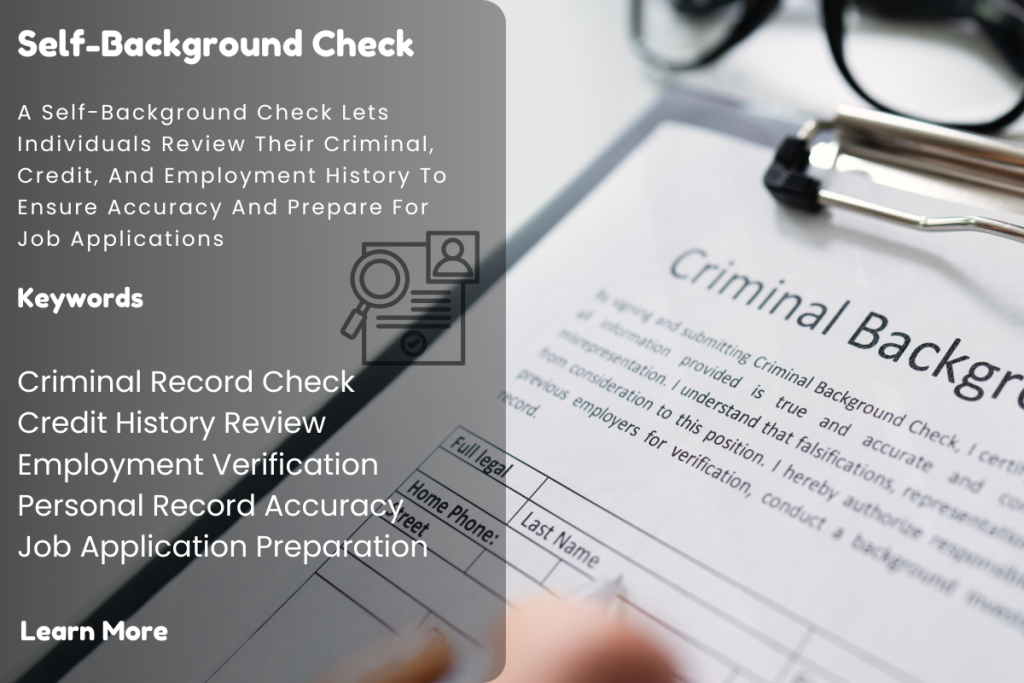
Introduction to Criminal Background Checks and Why You Should Run One on Yourself
A criminal background check is a process used to uncover an individual’s criminal history. This may include details such as arrests, convictions, warrants, and any charges that may be tied to an individual. These checks are typically conducted by employers, landlords, government agencies, and others who need to evaluate an individual’s history. Criminal background checks are an essential part of due diligence, helping entities make informed decisions regarding employment, housing, and other matters that could be influenced by a person’s criminal record.
Typically, a criminal background check will include:
- Criminal records: Information about arrests, convictions, and charges.
- Warrants: Any active warrants for an individual’s arrest.
- Court records: Details on cases that have been prosecuted and the outcomes.
- Sex offender registry: If applicable, whether the individual is listed on a public sex offender registry.
These checks are used by various entities to assess potential risks. For example, employers use them to screen potential hires, landlords use them to evaluate tenants, and the general public may use them for various other reasons.
Why Run a Criminal Background Check on Yourself?
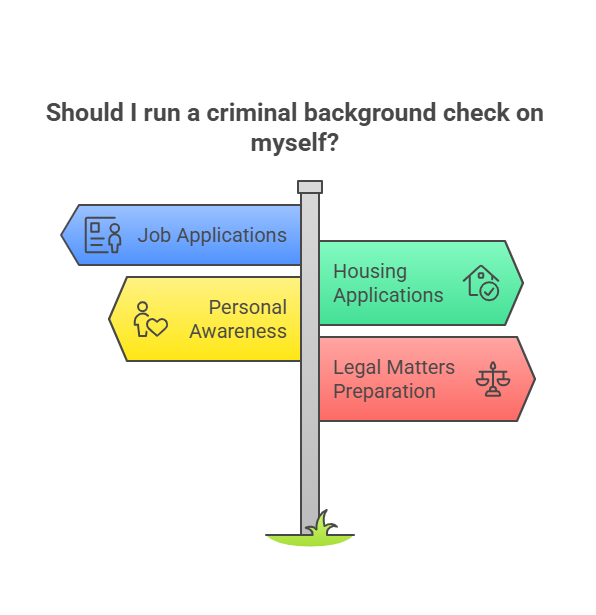
There are several reasons why you might want to run a criminal background check on yourself. By understanding what others might see, you can better prepare for situations where a background check is required. Here are some common scenarios where you might need to check your criminal background:
- Job Applications: When applying for a job, many employers perform background checks to ensure that candidates do not have criminal histories that would affect their ability to perform the job or pose a risk to the workplace.
- Housing Applications: Landlords often conduct background checks to verify that potential tenants have a clean criminal record, as criminal activity can impact the safety and reputation of their properties.
- Personal Awareness: It’s important to know what may be on your record, especially if you were arrested but never convicted or if there’s incorrect information that could harm your reputation.
- Preparing for Legal Matters: If you’re involved in any legal process, such as a divorce or custody battle, your criminal history might be reviewed. It’s better to be aware of what’s on file.
Running a criminal background check on yourself can provide peace of mind and give you the chance to clear up any potential discrepancies or outdated information. It’s a proactive way to avoid surprises when someone else runs a check on you.
The Importance of Accuracy in Criminal Background Checks
Accuracy is crucial when it comes to criminal background checks. Inaccurate or outdated information on a criminal record can significantly affect your personal and professional life. Whether applying for a job, renting a home, or dealing with legal matters, incorrect information could lead to rejection, denial, or unfair judgment.
For example, imagine you are applying for a job, and an outdated arrest record appears on your background check that was dismissed years ago. If the employer doesn’t take the time to verify the information, you could lose the opportunity despite having no actual criminal history. Similarly, incorrect information on a housing application could prevent you from securing a place to live.
Moreover, criminal background checks may include data from multiple sources. If a record is duplicated or inaccurately linked to you, it could unfairly harm your reputation. Running a background check on yourself allows you to address any potential inaccuracies and ensure that all the information is up to date and correct.
Steps to Run a Criminal Background Check on Yourself
Running a criminal background check on yourself can provide valuable insights into your personal records, helping you ensure there are no inaccuracies that could affect your future opportunities. This part outlines the different methods to conduct a background check, the necessary steps involved, and the key considerations for each option.
Step-by-Step Guide to Running a Criminal Background Check on Yourself
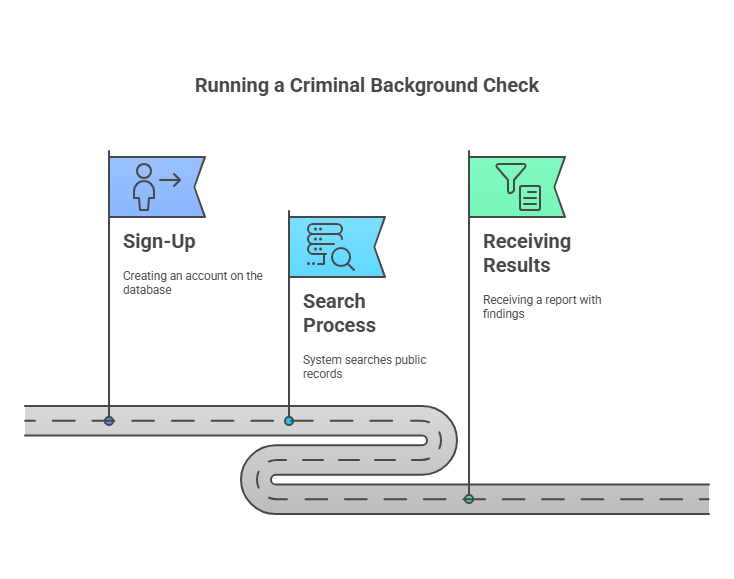
There are multiple ways to run a criminal background check on yourself, each with its own advantages, drawbacks, and levels of accuracy. Below, we will discuss each method in detail.
1. Using Online Public Record Databases
Online public record databases are an easy and convenient way to access criminal records. These services aggregate information from publicly available sources like court documents, arrest records, and other legal files.
How It Works:
- Sign-Up: Typically, you will need to create an account on the public record database, providing your name, date of birth, and sometimes your Social Security Number.
- Search Process: The system will search various public records for information that matches the details you’ve provided.
- Receiving Results: After the search, you will receive a report with criminal records, charges, or convictions that are associated with your name.
Pros:
- Fast and Convenient: Results can be provided in a matter of minutes or hours.
- Affordable: Some databases offer free reports or charge minimal fees for basic information.
- Easy Access: You can conduct the check from home, which makes the process quick and accessible.
Cons:
- Limited Accuracy: Public databases may not always reflect the most up-to-date or complete records.
- Incomplete Coverage: Some databases may not search all jurisdictional levels, meaning you could miss records from specific counties or states.
- Unverified Information: The information provided by these databases may not always be verified, leading to potential errors.
Tip for Improving Accuracy:
- Double-check your findings with law enforcement agencies or official sources to confirm the information in your report.
2. Requesting Your Criminal History Report from Law Enforcement Agencies
Requesting your criminal history report directly from law enforcement agencies is one of the most reliable ways to get a comprehensive and accurate criminal record. These agencies maintain official records, and the reports they issue are the most trustworthy.
How It Works:
- Request Submission: You will need to submit a request to the relevant law enforcement agency, which may include your name, date of birth, and sometimes additional identifiers like your Social Security Number.
- Fingerprinting: Some jurisdictions require you to be fingerprinted as part of the request, especially for nationwide checks.
- Payment: Most law enforcement agencies charge a fee to process your request.
- Processing Time: The time for processing can vary. It may take several days or weeks for the agency to process your request, depending on the jurisdiction and the depth of the search.
Pros:
- Most Accurate: Reports from law enforcement agencies are based on official records, making them the most accurate source of criminal history.
- Comprehensive: These reports may include information from local, state, and federal records, ensuring you receive a thorough overview of your criminal history.
Cons:
- Time-Consuming: The process can take several days or weeks to complete.
- Costs: Fees for these reports can vary widely, sometimes reaching $100 or more.
- Complexity: You may be required to complete additional paperwork or provide supporting documents.
Tip for Improving Accuracy:
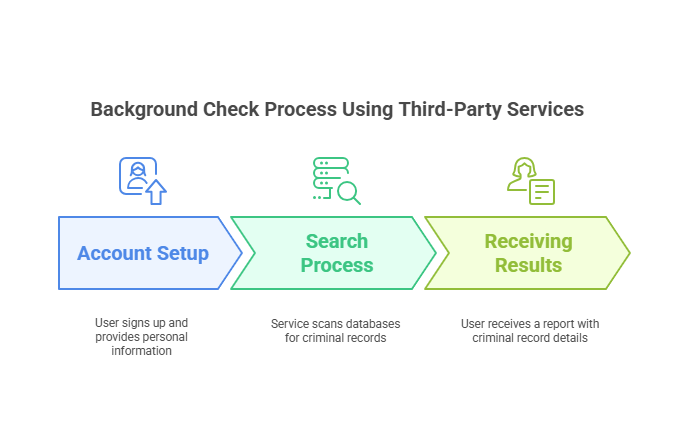
- Before submitting your request, ensure that your personal details are correct to avoid delays or errors.
3. Using Third-Party Background Check Services
Third-party background check services provide a quick and reliable way to access detailed criminal records. These services aggregate data from multiple sources, including court records, arrest data, and other legal documents.
How It Works:
- Account Setup: You will need to sign up for an account with a background check service and provide personal information such as your full name and date of birth.
- Search Process: The service will scan various databases for criminal records associated with your name.
- Receiving Results: After the search is completed, you will be given a report that outlines any criminal charges, convictions, or related information.
Pros:
- Thorough Reports: These services often provide in-depth reports that may cover arrests, charges, and convictions from multiple jurisdictions.
- Quick and Easy: The process is generally fast, with results available in a few days.
- Convenient: The process is online, which means you can access the report from anywhere.
Cons:
- Costs: Background check services typically charge fees that range from $20 to $100 or more, depending on the depth of the check.
- Variable Quality: The accuracy of the results can vary depending on the service provider, so you should choose a reputable service.
- Privacy Concerns: Ensure that the service you use follows strict data security practices to protect your personal information.
Tip for Improving Accuracy:
- Research and choose a trusted provider that has a track record of delivering reliable results. Cross-check findings with official sources when necessary.
What Information Do You Need to Run a Background Check?
To ensure the accuracy of the criminal background check, you’ll need to provide some essential personal details. This information helps to narrow down the search and confirm that the results are related to you. Commonly required details include:
- Full Name: Your full legal name is the primary identifier used in background checks.
- Date of Birth: This helps to differentiate you from others with similar names and ensures that the results are accurate.
- Social Security Number (SSN): This may be required to confirm your identity and access nationwide records.
- Address History: Providing past addresses can help refine the search, especially if you’re seeking county-level records that may not appear in national searches.
- Other Identifiers: In some cases, fingerprinting or additional details such as previous names may be requested to ensure accuracy.
By providing complete and accurate information, you can avoid errors and ensure that the background check results are correct.
Data Table: Comparison of Methods to Run a Criminal Background Check
| Method | Cost | Time to Complete | Accuracy | Pros | Cons |
|---|---|---|---|---|---|
| Online Public Record Databases | Free to $50+ | Minutes to hours | Varies (often less accurate) | – Fast and convenient – Accessible from home – Low-cost options available |
– May lack complete records – Data might be outdated or inaccurate |
| Requesting from Law Enforcement | $10 – $100+ | Several days to weeks | High (official records) | – Official and reliable – Detailed coverage – Nationwide checks available |
– Processing time can be long – Complex paperwork and fees |
| Third-Party Background Check Services | $20 – $100+ | 1-3 days | High (depends on provider) | – In-depth reports – Fast and user-friendly – Can cover multiple sources |
– Costly – Quality varies – Privacy concerns |
Best Practices, Common Mistakes, FAQs, and Conclusion
Running a criminal background check on yourself is a vital process for ensuring personal and professional security. It’s important to approach this task systematically to avoid errors and ensure you have the most accurate and up-to-date information. In this section, we will cover best practices, common mistakes to avoid, and provide answers to frequently asked questions.
Best Practices When Running a Criminal Background Check on Yourself
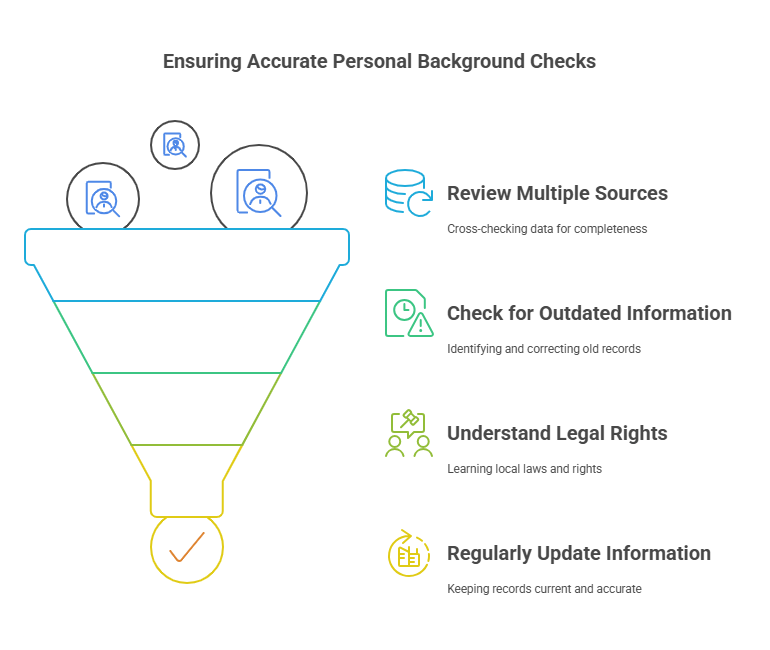
To ensure that your background check is thorough and accurate, it’s essential to follow best practices. These practices will help you maximize the quality of the results and avoid common pitfalls.
1. Review Multiple Sources
Even if you run a background check through an official law enforcement agency or trusted third-party service, it’s a good idea to cross-check the information with multiple sources. Criminal records can vary by jurisdiction, and sometimes details might be missing or inaccurate in one database but present in another.
Why This Matters:
- Background check services, especially online public records databases, may not always have comprehensive coverage, and you could miss important details.
- Reviewing multiple sources helps ensure that no relevant information is overlooked.
2. Check for Outdated Information
Background checks may contain outdated information, especially if there has been a long gap since the last report. This is particularly common for online public record databases that might not update their information regularly.
Why This Matters:
- If you have previously resolved legal issues or have been cleared of certain charges, outdated records can cause unnecessary problems in your job search or housing application.
- It’s critical to ensure that outdated records are removed or updated when you spot them.
3. Understand the Laws Around Background Checks
Laws surrounding criminal background checks vary by jurisdiction. In some regions, you may have the legal right to request your criminal history report at no charge. Understanding the legal framework in your area will help you navigate the process smoothly.
Why This Matters:
- Some jurisdictions offer free access to your criminal history, while others may charge a fee.
- Knowing your rights helps ensure that you follow the appropriate procedures and avoid unnecessary costs.
4. Regularly Update Your Information
Criminal records can change over time, especially if new incidents occur or if you resolve any pending charges. It’s wise to periodically run a background check on yourself, particularly if you anticipate applying for jobs or housing.
Why This Matters:
- A routine check ensures that you are always aware of your criminal history status and can make corrections if necessary.
Common Mistakes to Avoid
While running a criminal background check on yourself is a relatively straightforward process, there are a few common mistakes people tend to make. Avoiding these errors will help ensure a smoother experience.
1. Relying Solely on One Source
Many individuals make the mistake of relying on just one source, such as an online public record database, to conduct their background check. As mentioned earlier, these sources may not be fully comprehensive or up-to-date.
Why This Is a Mistake:
- Single-source checks often lead to incomplete or inaccurate results, leaving out important information or updates.
- Verifying results across multiple sources can reduce the risk of inaccuracies affecting your job search or housing application.
2. Ignoring the Quality of Third-Party Services
While third-party background check services can be very helpful, not all services are equally reliable. Some may have access to limited databases or may not adhere to proper data protection standards.
Why This Is a Mistake:
- Using a low-quality service can result in incomplete or erroneous information that may affect your ability to secure a job or housing.
- It’s important to choose a reputable service with a proven track record for delivering thorough, accurate background checks.
3. Not Correcting Errors
If you find incorrect or outdated information in your criminal background check, it’s crucial to take steps to correct it. Failing to address errors can lead to missed opportunities and complications in professional or personal matters.
Why This Is a Mistake:
- Many individuals assume that errors on their background check are permanent and do nothing to correct them. However, these errors can be rectified by contacting the relevant authorities or updating records through legal channels.
- If left unaddressed, errors can impact future employment, housing, and other opportunities.
4. Overlooking Minor Offenses
Minor offenses may not seem significant, but they can still appear on your background check. Failing to recognize these offenses, particularly when applying for jobs or housing, could lead to misunderstandings or even rejections.
Why This Is a Mistake:
- Minor offenses may still be used against you, especially in sensitive industries or when applying for positions involving security clearances or trust-based roles.
- Being aware of these records ahead of time allows you to prepare and address potential concerns with prospective employers or landlords.
FAQs About Criminal Background Checks
To help you navigate the process of running a criminal background check on yourself, here are answers to some of the most frequently asked questions:
How do I get a copy of my criminal background check?
To obtain a copy of your criminal background check, you can request it directly from law enforcement agencies or use third-party background check services. Depending on the jurisdiction, you may need to provide personal information, such as your full name, date of birth, and Social Security Number. In some cases, fingerprinting may be required.
Can I run a criminal background check on myself for free?
In some cases, you may be able to request a copy of your criminal history report for free, especially through government or law enforcement agencies. However, many online public record databases and third-party background check services charge fees for access to comprehensive reports.
What should I do if I find incorrect information in my criminal background check?
If you find incorrect information, you should contact the agency or service that provided the report. If it's from a law enforcement agency, you can request a correction or update to your record. If it's from a third-party service, you may need to dispute the information with them or follow their procedures to have the record corrected.
How long does it take to run a criminal background check on myself?
The time it takes to run a criminal background check can vary. Online public record databases may provide results within minutes, while requests to law enforcement agencies can take several days or even weeks, depending on the jurisdiction. Third-party services generally offer results within 1 to 3 days.
Can I run a criminal background check on myself to prepare for a job?
Yes, running a background check on yourself before applying for a job is a smart idea. It allows you to address any discrepancies or issues before a potential employer sees the report. It also helps you prepare to explain any past offenses or legal issues, should they arise during the hiring process.
Conclusion
Running a criminal background check on yourself is an essential step in ensuring that your personal and professional opportunities are not hindered by inaccuracies or outdated information. By following the best practices outlined in this article and avoiding common mistakes, you can gain confidence in your background check results and take necessary actions to correct any errors.
Being proactive in reviewing your criminal history will help you stay prepared for employment opportunities, housing applications, and other important life decisions. If you need more thorough checks or assistance with correcting any inaccuracies, using a reliable background check service like PreciseHire can be an invaluable tool in ensuring the accuracy of your records.
Taking charge of your own background check not only helps you maintain a clean record but also gives you the peace of mind to move forward in all aspects of life with confidence.
